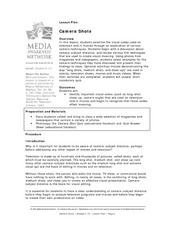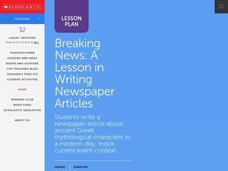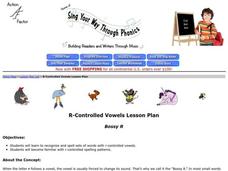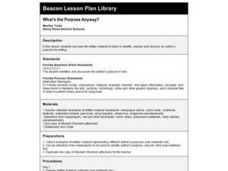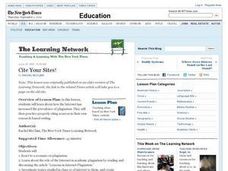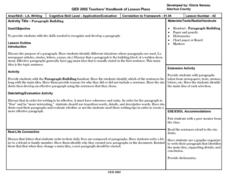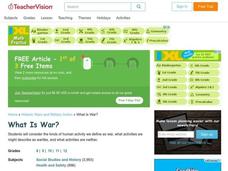Curated OER
Fun With Chicka Chicka Boom Boom
Students read the book Chicka Chicka Boom Boom and listen to the musical tape. Then they make their own coconut trees, adding their own letters. They express and record their favorite parts. All are displayed on a bulletin board.
Curated OER
That Is Not My Opinion!
Being an informed citizen requires distinguishing fact from opinion and understanding persuasion methods. Secondary learners evaluate newspaper editorials. They read opinion pieces, identify the writer's purpose and position on an issue,...
Curated OER
Fact V. Opinion
Students use statements out of newpapers to distinguish between facts and opinions. They discuss these differences as well.
Curated OER
Help Wanted: President of the United States
Young scholars consider qualities and United States president should have. In this government lesson, students research the responsibilities of the president and use that information to create an advertisement that describes the job and...
Curated OER
Career Connections: The Connection Corner
Students will create a career information center. In this careers lesson plan, students research careers on a local and national level and create a help wanted ad for an occupation of personal interest. Students create...
Curated OER
Camera Shots
Understanding how visual codes such as long-shots, close-ups, and camera angles affect meaning helps prepare young filmmakers to plan their own productions. The concepts embedded could also be used to analyze photographs and paintings.
Curated OER
The Lion, the Witch and The Wardrobe: Literature and Theater
Students read and discuss the literary elements of "The Lion, the Witch and the Wardrobe" by C.S. Lewis. They explore the elements of dramatic performance and create a TV news program based on life in Narnia. They videotape their...
Curated OER
A Plump and Perky Turkey
Help readers recognize elements in a story. They will use pictures and text to gain meaning from written material. Have learners listen to the story A Plump and Perky Turkey and participate in a discussion. They recognize the...
Curated OER
Plot the Oysters' Peril!
Use comic strips to teach sequencing in narrative poetry. As homework, each class member selects a comic strip with 4-8 frames, cuts the frames apart, places the pieces in an envelope, and brings the envelope to class. Class members swap...
Curated OER
Breaking News
Young scholars organize a newspaper article using a worksheet that helps them study the vocabulary of news articles. They write newspaper articles about mythical creatures invading contemporary Los Angeles.
Curated OER
Picture Collage Book Report: Voltaire's Candide
Here's an alternative to a traditional book report for your class to demonstrate that they understand and can articulate the main character's evolution and the social themes presented in Voltaire's satirical novel Candide. Your young...
English Enhanced Scope and Sequence
Media Literacy Applied
After investigating various forms of print, oral, and electronic media as sources of information, class members research a historical figure and produce a résumé for this person. While templates are provided for an initial sorting...
Curated OER
Survival Experts
Students take on the role of survival experts as they research and produce brochures or guides to educate others about what to do in the event of a natural disaster.
Curated OER
Cooking Terms
Using culinary text books, matching exercises, and an "Old Maid" style card game, classroom chefs learn and distinguish cooking vocabulary. They identify terms and techniques used in a chicken/vegetable stir fry demonstration.
Curated OER
Firestorms: The Bombing of Civilians in World War II: War, Ethics, Guernica, Precision Bombing
Young scholars explore the history, rationale and ethics of civilian bombing in times of war. They consider war strategy, the laws and conventions of war and international implications.
Curated OER
Sing Your Way Through Phonics Lesson Plan
Students recognize and spell sets of words with r-controlled vowels. They become familiar with r-controlled spelling patterns.
Curated OER
What's the Purpose Anyway?
Examine author's purpose in newspaper articles, comic books, cookbooks, encyclopedias and other forms of written materials. Working in groups, middle and high schoolers read teacher-selected articles and write an explanation of the...
Curated OER
Cite Your Sites
What information would you find in an almanac that you would not find in an atlas? What is the difference between a dictionary and a thesaurus? Using a Cite Your Sites worksheet on which they record their observations, groups participate...
Curated OER
Paragraph Building
Build the skills your budding authors need to develop to compose well-structured paragraphs. Give them the topic sheet (included here), and have them write a cohesive paragraph using the ideas listed. Consider having them include two...
Curated OER
Author's Purpose
A simple activity for young readers, this introduces the idea of author purpose. Learners analyze various types of texts (newspaper articles, magazines, books, advertisements, etc.) and determine if the author's purpose for writing was...
Curated OER
Getting the Story
Students examine and discuss the basic elements of a newspaper article. They listen to articles, discuss the 'inverted pyramid' style of a breaking news article, and list imaginary current events based on mythological characters.
Curated OER
For the Fun of It
Students view pictures of Amelia Earhart and discuss the social and historical context of her life. They read excerpts of Earhart's autobiography "The Fun of It" and analyze her purpose in writing it.
Curated OER
What Is War?
What kinds of human activity do we define as "warlike"? Middle and high schoolers examine various definitions of war and types of warfare, especially as these descriptions relate to the kinds of war we are witnessing at the beginning of...
Curated OER
Cleveland may gamble on gambling
Students write a news feature or editorial discussing the debate of whether gambling should be legalized in Cleveland. Students research and debate about the issue. Students interview community members to hear views.







